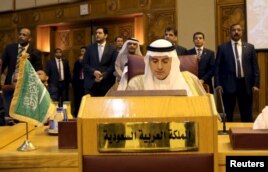15 January, 2016
Arab League foreign ministers said they support Saudi Arabia in its dispute with Iran.
Tensions increased after Saudi Arabia executed a top Iranian Shi'ite Muslim religious leader January 2.
Demonstrators attacked and burned parts of the Saudi embassy in Tehran and in other countries after Sheikh Nimr al-Nimr was executed with 46 others.

Saudi Foreign Minister Adel al-Jubeir at the Arab foreign minister's meeting at the Arab League in Cairo, Egypt, Jan. 10, 2016.
Eight Arab countries have weakened or ended diplomatic relations with Iran because of the attacks.
The foreign ministers and diplomats gathered Sunday in Cairo.
They applauded when United Arab Emirates Foreign Minister Sheikh Abdullah Ben Zayid strongly criticized Iran during the meeting.
He said Iran uses religion to cause tensions between countries in the Middle East and inside Arab countries. He said Iran creates and supports terrorist groups that spread violence in the Middle East.
Saudi Foreign Minister Adel Jubeir said Iran helps people in Arab countries work against their governments. He said Iran should "stop interfering in (the) internal affairs" of its neighbors.
He said Saudi Arabia does not want conflict between Sunni and Shi'ite Muslims. He accused Iran of worsening tensions between the two groups after its revolution in 1979. And, he said Saudi Arabia opposes the creation of tension between the groups.
Last week, Iranian President Hassan Rouhani called the attack on the Saudi Embassy "wrong and against the law." He also said the execution of al-Nimr was a crime. Al-Nimr had publicly criticized the Saudi royal family.
Nabil El Arabi leads the Arab League. He said Iran can reduce tensions with its neighbors. He said Iran must take steps to show it wants to improve relations and not interfere in the governing of other countries.
Hilal Kashan is a professor of political science at the American University of Beirut. He told VOA the Arab League meeting will probably not produce any results.
He said, "the Saudis simply wanted a statement of solidarity (from the Arab League) and they got it. They did not really ask for more or expect more." He notes that Iran suspended some police officials in Tehran after the Saudi embassy was attacked.
Pakistan also ended diplomatic relations with Iran after the embassy attack. Saudi Arabia wants Pakistan's support in its dispute with Iran. But Pakistan has large numbers of Sunnis and Shi'ites and must have good relations with both Saudi Arabia and Iran.
Time magazine reported that Pakistani Prime Minister Nawaz Sharif has suggested that Pakistan could help Saudi Arabia and Iran negotiate an end to their conflict.
I'm Jim Tedder.
Edward Yeranian in Cairo reported on this story for VOANews. Christopher Jones-Cruise adapted his story for Learning English. He also used information from Time. Kathleen Struck was the editor.
Write to us in the Comments section, or visit our 51VOA.COM, about this issue.
________________________________________________________________
Words in This Story
applaud – v. to strike the hands together over and over to show approval or praise
internal affairs – n. events that take place inside a country
solidarity – n. a feeling of unity between people who have the same interests, goals, etc.